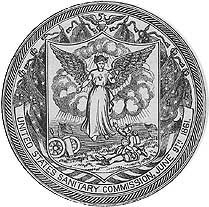18 March 2006
Today in Civil War History
1864 Sanitary Commission Fair in Washington

The U.S. Sanitary Commission Fair in Washington, D.C., closes with President Lincoln commending the organization for its fine work.
The Sanitary Commission formed in 1861, the creation of northern civilians concerned for Union troops' medical care. The voluntary association raised more than $22 million in donations and medical supplies, and it represented a major contribution by Yankee women to the war effort. Although administered by men, the vast majority of its volunteers were women. The commission raised supplies and provided lodging and meals to wounded soldiers and troops returning home on furlough. It gathered medicine and bandages for the army and sent inspectors to the camps to oversee the set up of clean water supplies, latrines, and cooking facilities. Volunteers worked on the front lines as doctors and nurses helped evacuate wounded soldiers to the rear.
Some generals and army doctors found commission workers to be annoying and troublesome, especially when they criticized army medical practices. One doctor complained about what he saw as "sensation preachers, village doctors, and strong-minded women" interfering with the doctors' work. Some of these women included noted reformer Dorthea Dix and Mary Ann Bickerdyke, a tough no-nonsense church volunteer who became the commission's agent to the Army of the Tennessee before the Battle of Shiloh. She was completely dedicated to caring for common soldiers, and she was not afraid to challenge doctors and officers when she thought their care was being compromised. At Chattanooga, she ordered timbers for breastworks burned to keep wounded soldiers warm--when military police asked her who had authorized the burning, she replied, "Under the authority of God Almighty. Have you got anything better than that?"
The commission's work fit 19th century women's socially proscribed roles as caretakers and nurturers of men, but the work also allowed women to carve out their own careers, and it could be seen as a step forward for the women's rights movement. Lincoln said at the closing of the Sanitation Commission Fair, "if all that has been said by orators and poets since the creation of the world in praise of women applied to the women of America, it would not do them justice for their conduct during this war."

The U.S. Sanitary Commission Fair in Washington, D.C., closes with President Lincoln commending the organization for its fine work.
The Sanitary Commission formed in 1861, the creation of northern civilians concerned for Union troops' medical care. The voluntary association raised more than $22 million in donations and medical supplies, and it represented a major contribution by Yankee women to the war effort. Although administered by men, the vast majority of its volunteers were women. The commission raised supplies and provided lodging and meals to wounded soldiers and troops returning home on furlough. It gathered medicine and bandages for the army and sent inspectors to the camps to oversee the set up of clean water supplies, latrines, and cooking facilities. Volunteers worked on the front lines as doctors and nurses helped evacuate wounded soldiers to the rear.
Some generals and army doctors found commission workers to be annoying and troublesome, especially when they criticized army medical practices. One doctor complained about what he saw as "sensation preachers, village doctors, and strong-minded women" interfering with the doctors' work. Some of these women included noted reformer Dorthea Dix and Mary Ann Bickerdyke, a tough no-nonsense church volunteer who became the commission's agent to the Army of the Tennessee before the Battle of Shiloh. She was completely dedicated to caring for common soldiers, and she was not afraid to challenge doctors and officers when she thought their care was being compromised. At Chattanooga, she ordered timbers for breastworks burned to keep wounded soldiers warm--when military police asked her who had authorized the burning, she replied, "Under the authority of God Almighty. Have you got anything better than that?"
The commission's work fit 19th century women's socially proscribed roles as caretakers and nurturers of men, but the work also allowed women to carve out their own careers, and it could be seen as a step forward for the women's rights movement. Lincoln said at the closing of the Sanitation Commission Fair, "if all that has been said by orators and poets since the creation of the world in praise of women applied to the women of America, it would not do them justice for their conduct during this war."




